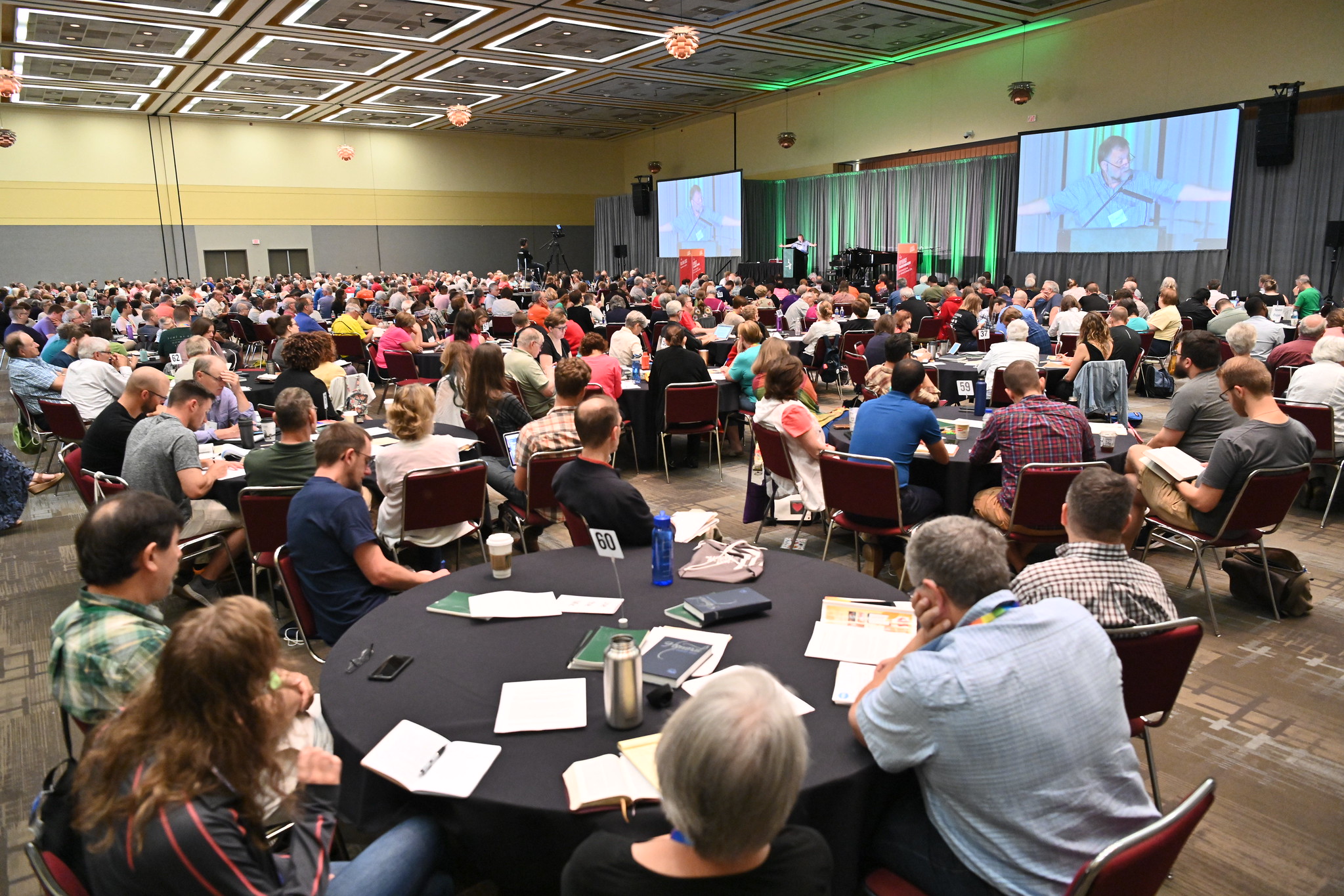KANSAS CITY, Missouri (Mennonite Church USA) — Delegates gave a standing ovation to the introduction of the Churchwide Statement on the Abuse of Child Migrants resolution, which states that as disciples of Jesus, MC USA condemns the treatment of immigrants of families and children at the border. Delegates were invited to discuss the draft informally and bring any questions to the Resolutions Committee, with a vote planned for the morning of July 6.
The resolution was brought to the Resolutions Committee at the beginning of MennoCon19, and the committee provided guidance to ensure that it stayed in line with previous immigration documents, spoke for the whole church and brought input from leadership of Iglesia Menonita Hispana, Mennonite Central Committee and others passionate about immigration justice, said Samuel Voth Schrag, chair of the Resolutions Committee.
Membership Guidelines
Michael Danner, associate executive director of church vitality and engagement, provided a brief outline and history of the membership guidelines, beginning with their introduction at the Nashville Delegate Assembly in 2001. Danner said that while people asked about making changes to the guidelines at this Assembly, the decision not to was primarily due to staff transitions, including Guyton and Danner. “With new staff in new roles, we believed we could not create a good process in that amount of time,” he said.
After feedback from the Constituency Leaders Council (CLC) in March 2019, Danner and Iris de León-Hartshorn, associate executive director of Operations, met with a process consultant to create a process for addressing the Membership Guidelines, Danner said. This draft was presented to the Executive Board and other stakeholders, including conference ministers. “Recognizing that any changes to this have large implications for LGBTQ groups, we also consulted with Brethren Menno Council for LGBT Interests, Pink Mennos and the inclusive pastors group,” Danner said.
“After this feedback, there is a strong consensus that the initial process needs more work before moving the church forward,” said Danner. “We’re looking for a way to open up space that is different than conversations we’ve had in the past.”
Delegates were given feedback sheets with two questions to discuss in table groups. Their individual written responses were collected. “We will take your feedback and create a report that will be given to the CLC for ongoing discernment for this process over the next two years,” said Danner.
Equipping: Walking together in the Spirit
Tom Yoder Neufeld’s final equipping session for the delegates focused on maintaining the unity of the Spirit even when the experience of walking together can be difficult. He offered practices to use in this walk such as humility, patience and seeing the face of God in one another. Patience means “enduring with hope,” and not just letting things go, and it’s hard, he said.
“Don’t ever stop checking the horizon. The unity of the Spirit is bigger, deeper and more profound than any of our organizations and structures,” he said, adding that God uses even our failures and schisms to create space to learn from one another.
After time to discuss among their tables, several people shared reflections and questions during open mic time. One delegate asked about the guidance in Ephesians 5 to “not be partners with” certain people. Another questioned at what point we say no to things that are harmful and not welcome in the church, such as abuse. Neufeld responded that there are certainly times we should say no, though this list varies among us.
One delegate asked about a trauma-informed reading of this scripture, mentioning the difficulty in how we talk about unity for survivors of abuse and those who experience physical suffering, such as LGBTQ youth struggling with suicide or those facing racial injustices. Another delegate questioned how power dynamics function when we do not begin on mutual ground. Another asked about how we acknowledge that the burden to walk together falls heaver on minorities in the church.
“That burden should be felt most by those who have power,” said Yoder Neufeld. “Those who should really hear about humility are those who are used to having their needs put before the needs of others. I struggle to live with that myself.”


